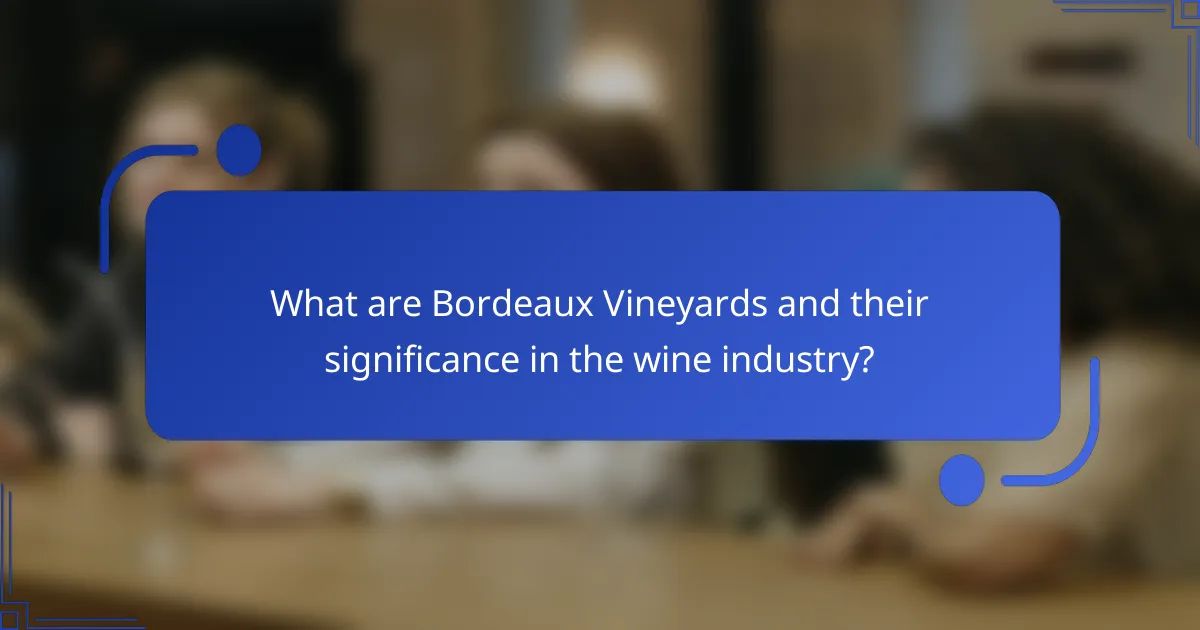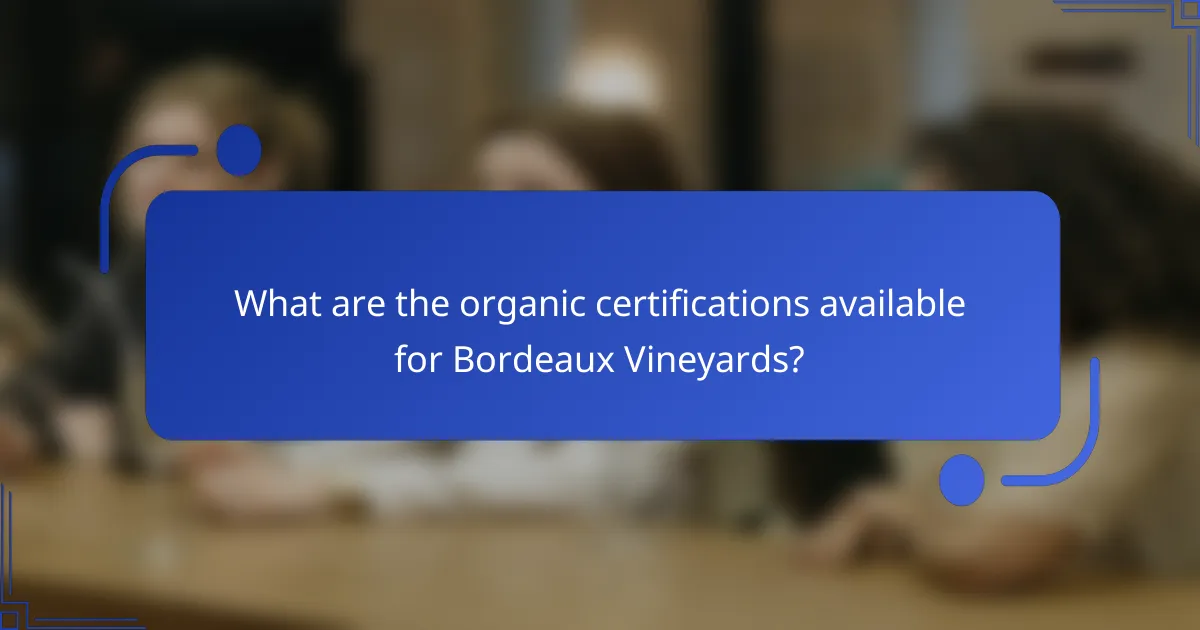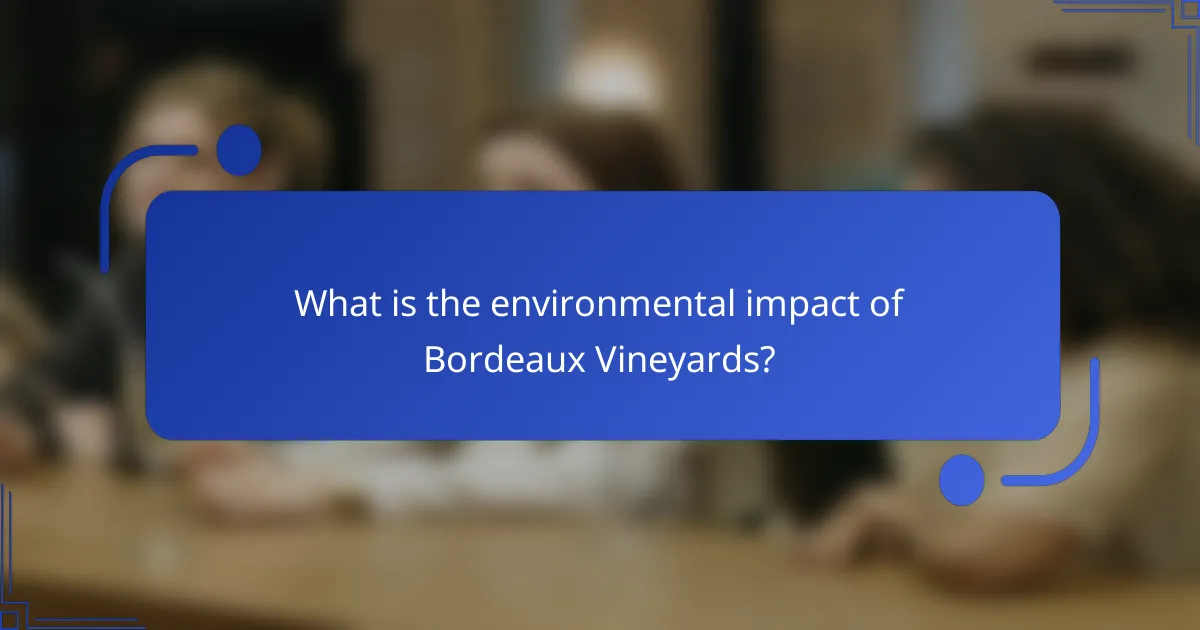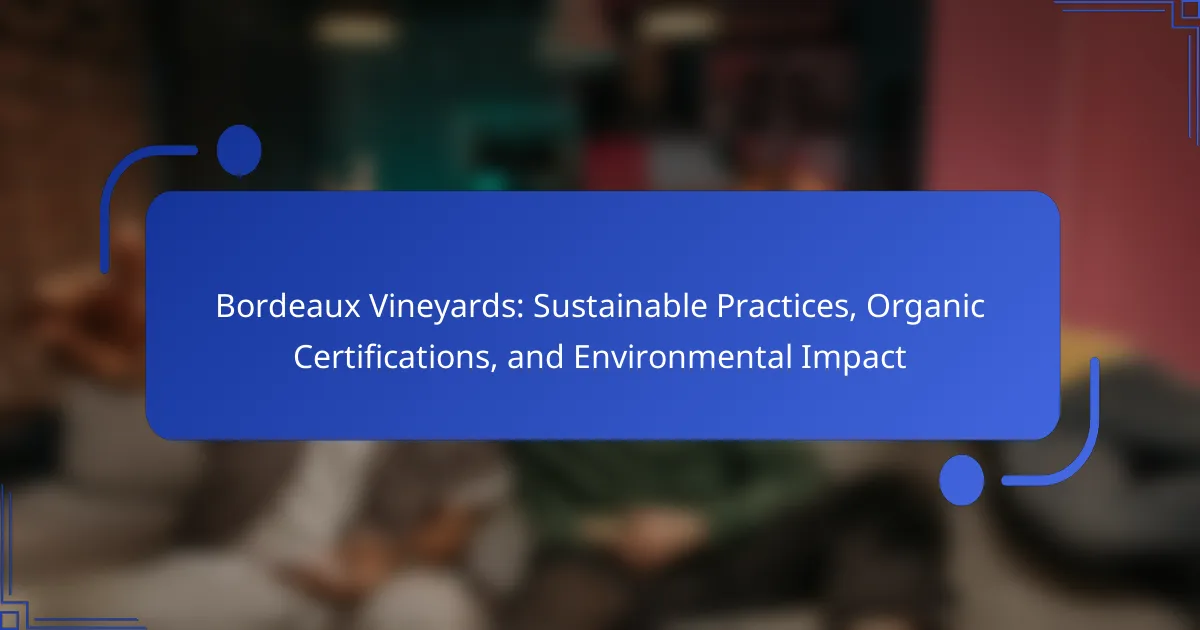
What are Bordeaux Vineyards and their significance in the wine industry?
Bordeaux Vineyards are renowned wine-producing regions located in southwestern France. They cover approximately 120,000 hectares and are famous for their high-quality wines. Bordeaux is home to several grape varieties, including Merlot, Cabernet Sauvignon, and Cabernet Franc. These vineyards contribute significantly to the global wine market, producing around 700 million bottles annually. The region’s classification system, established in 1855, ranks vineyards based on quality, influencing pricing and prestige. Bordeaux wines are often considered benchmarks for other wine regions worldwide. Additionally, Bordeaux Vineyards have embraced sustainable practices and organic certifications, responding to environmental concerns in viticulture. This commitment enhances their reputation and ensures long-term viability in the wine industry.
How do Bordeaux Vineyards differ from other wine regions?
Bordeaux vineyards differ from other wine regions primarily due to their unique terroir and strict classification system. The Bordeaux region has a diverse range of microclimates and soil types that contribute to the complexity of its wines. This area is renowned for specific grape varieties like Merlot and Cabernet Sauvignon, which thrive in its climate. Bordeaux also employs a classification system established in 1855, ranking estates based on quality and reputation. This system is not commonly found in many other wine regions. Additionally, Bordeaux vineyards are increasingly adopting sustainable practices and organic certifications, setting them apart in their environmental impact efforts. The region’s commitment to sustainability is evident in initiatives like the Bordeaux Wine Council’s “Sustainable Bordeaux” program, which promotes eco-friendly viticulture. Overall, these factors create a distinct identity for Bordeaux vineyards compared to other wine-producing regions.
What unique geographical and climatic factors influence Bordeaux Vineyards?
Bordeaux vineyards are influenced by several unique geographical and climatic factors. The region features a temperate maritime climate. This climate is characterized by mild winters and warm summers. The Atlantic Ocean moderates temperature extremes. It also provides humidity, which benefits vine growth.
Bordeaux is situated on the Gironde estuary. This location allows for diverse soil types, including gravel, clay, and limestone. Each soil type contributes to the flavor profile of the wines produced. The region experiences significant rainfall, averaging 800 mm annually. This rainfall is crucial for vine health but requires careful management to prevent disease.
The area’s topography includes rolling hills and flat plains. These variations create microclimates that can affect grape ripening. The interplay of these factors results in a unique terroir. This terroir is essential for the distinctiveness of Bordeaux wines.
What grape varieties are predominantly grown in Bordeaux Vineyards?
The predominant grape varieties grown in Bordeaux vineyards are Merlot, Cabernet Sauvignon, and Cabernet Franc. Merlot accounts for approximately 66% of the total vineyard area in Bordeaux. Cabernet Sauvignon follows with about 22% of the area. Cabernet Franc, while less common, constitutes around 10% of the vineyards. These varieties thrive in Bordeaux’s climate and soil conditions, contributing to the region’s renowned wine quality. Bordeaux is also known for blending these varietals to create complex flavors in its wines.
What role do sustainable practices play in Bordeaux Vineyards?
Sustainable practices play a crucial role in Bordeaux vineyards by promoting environmental health and grape quality. These practices include organic farming, water conservation, and biodiversity enhancement. Bordeaux vineyards have implemented integrated pest management to reduce chemical usage. This approach helps maintain soil fertility and ecosystem balance. According to the Bordeaux Wine Council, over 50% of vineyards in the region are certified organic or in conversion. Sustainable practices also improve the long-term viability of the vineyards. They reduce carbon footprints and enhance resilience against climate change. This commitment to sustainability aligns with consumer demand for environmentally friendly products.
How are sustainable practices defined in the context of Bordeaux Vineyards?
Sustainable practices in Bordeaux vineyards are defined as methods that promote environmental health and resource conservation. These practices include organic farming, integrated pest management, and water conservation techniques. Bordeaux vineyards aim to reduce chemical inputs and enhance biodiversity. The Bordeaux Wine Council has established guidelines for sustainable viticulture, known as “HVE” (High Environmental Value). This certification requires adherence to specific ecological criteria, such as maintaining habitats and minimizing pollution. Research indicates that these practices lead to healthier soils and improved grape quality. Additionally, sustainable practices help maintain the region’s reputation for high-quality wines.
What specific sustainable practices are implemented in Bordeaux Vineyards?
Bordeaux vineyards implement several specific sustainable practices. They utilize organic farming techniques to reduce chemical inputs. Cover crops are planted to enhance soil health and prevent erosion. Integrated pest management is employed to minimize pesticide use. Water conservation measures are practiced through drip irrigation systems. Biodiversity promotion is a key focus, with native plants and animals encouraged. Many vineyards are certified organic, adhering to strict environmental standards. These practices contribute to the overall sustainability of the Bordeaux wine industry.

What are the organic certifications available for Bordeaux Vineyards?
The organic certifications available for Bordeaux Vineyards include Ecocert and AB (Agriculture Biologique). Ecocert is a certification body recognized for organic farming standards in Europe. It ensures that vineyards follow strict organic practices, including the prohibition of synthetic pesticides and fertilizers. The AB label is the official French organic certification. It guarantees that products are produced according to organic farming regulations. Both certifications reflect a commitment to sustainable viticulture. Bordeaux vineyards with these certifications demonstrate adherence to environmentally friendly practices. These certifications are crucial for marketing organic wines in both domestic and international markets.
How do Bordeaux Vineyards achieve organic certification?
Bordeaux Vineyards achieve organic certification by following strict agricultural practices. These practices prohibit the use of synthetic pesticides and fertilizers. Instead, vineyards utilize organic methods such as natural pest control and composting. They must also maintain soil health through crop rotation and cover cropping. Compliance with the European Union’s organic farming regulations is essential. This includes undergoing inspections and audits by certifying bodies. The process typically takes a minimum of three years to complete. Successful certification demonstrates commitment to sustainability and environmental stewardship.
What are the requirements for obtaining organic certification in Bordeaux?
To obtain organic certification in Bordeaux, vineyards must meet specific criteria set by the European Union. These criteria include using organic farming methods, which prohibit synthetic pesticides and fertilizers. The soil must be managed to promote biodiversity and health. Additionally, vineyards must maintain detailed records of farming practices and inputs. A three-year transition period is required before the first harvest can be certified organic. Compliance with regulations is verified through inspections by accredited certifying bodies. These requirements ensure that organic practices are upheld in Bordeaux vineyards.
Which organizations provide organic certification for Bordeaux Vineyards?
The main organizations providing organic certification for Bordeaux Vineyards are Ecocert and Qualité France. Ecocert is a leading certification body recognized for its stringent organic standards. Qualité France also offers organic certification, focusing on compliance with European regulations. Both organizations ensure that vineyards adhere to organic farming practices. This includes prohibiting synthetic pesticides and fertilizers. Their certifications are crucial for vineyards aiming to market organic wines. Compliance with these organizations enhances the credibility of Bordeaux vineyards in the organic market.
What benefits do organic certifications offer to Bordeaux Vineyards?
Organic certifications offer several benefits to Bordeaux vineyards. These certifications enhance marketability and consumer trust. Organic wines often attract premium pricing due to their perceived quality. Additionally, organic practices improve soil health and biodiversity. This leads to better grape quality and sustainability. Studies show that organic vineyards can have lower pesticide residues. Moreover, organic farming reduces environmental impact, aligning with consumer preferences for sustainability. These factors contribute to long-term profitability for Bordeaux vineyards.
How do organic certifications affect consumer perception of Bordeaux wines?
Organic certifications enhance consumer perception of Bordeaux wines by signaling quality and sustainability. Consumers often associate organic labels with healthier and more environmentally friendly products. This perception can lead to a willingness to pay higher prices for certified wines. Research indicates that organic certification can increase consumer trust in wine authenticity. A study found that 70% of consumers prefer organic wines due to perceived health benefits. Additionally, organic Bordeaux wines can attract environmentally conscious buyers. The certifications can differentiate these wines in a competitive market. Overall, organic certifications positively influence consumer choices and brand loyalty in Bordeaux wines.
What economic advantages do certified organic Bordeaux Vineyards experience?
Certified organic Bordeaux vineyards experience several economic advantages. These vineyards often command higher prices for their wines. Consumers are willing to pay a premium for organic products due to perceived health benefits and environmental sustainability. Additionally, certified organic vineyards may benefit from increased market demand. The organic wine market has been growing steadily, with a 20% increase in sales reported in recent years. Furthermore, these vineyards can access niche markets that prioritize sustainability. Organic certification can also lead to reduced input costs over time, as they rely on natural pest management and fertilization methods. This can enhance profitability in the long run. Moreover, organic vineyards often receive government incentives and grants aimed at promoting sustainable agriculture.

What is the environmental impact of Bordeaux Vineyards?
Bordeaux Vineyards have a significant environmental impact due to their agricultural practices. The vineyards use large amounts of water for irrigation, which can deplete local water resources. Additionally, the application of pesticides and fertilizers can lead to soil degradation and water pollution. The carbon footprint of Bordeaux wine production is also notable, primarily from vineyard maintenance and transportation. However, many Bordeaux producers are adopting sustainable practices to mitigate these impacts. For instance, some vineyards are implementing organic farming methods and reducing chemical usage. Research indicates that these practices can enhance biodiversity and improve soil health. Overall, while Bordeaux Vineyards contribute to environmental challenges, efforts are underway to promote sustainability.
How do Bordeaux Vineyards contribute to biodiversity?
Bordeaux Vineyards contribute to biodiversity by implementing sustainable agricultural practices. These practices include maintaining cover crops and natural habitats. Cover crops enhance soil health and provide habitats for various species. Natural habitats support pollinators and other beneficial organisms. Bordeaux vineyards also promote agroforestry by integrating trees within vineyard landscapes. This integration fosters a diverse ecosystem and enhances carbon sequestration. Studies show that vineyards with diverse plant life have higher species richness. Additionally, organic certifications in Bordeaux vineyards encourage biodiversity-friendly practices. These efforts collectively create a balanced ecosystem that benefits both agriculture and wildlife.
What specific practices enhance biodiversity in Bordeaux Vineyards?
Cover crops are a specific practice that enhances biodiversity in Bordeaux vineyards. These plants provide habitat for beneficial insects and improve soil health. Intercropping with native flora increases the variety of species present. Organic farming practices, such as avoiding synthetic pesticides, support a diverse ecosystem. Implementing agroforestry techniques integrates trees into vineyard landscapes, promoting wildlife habitats. Maintaining hedgerows around vineyards also fosters biodiversity by providing shelter and food sources. Regular monitoring of species diversity helps assess the effectiveness of these practices. Research indicates that these methods contribute to a more resilient vineyard ecosystem.
How do Bordeaux Vineyards manage water resources sustainably?
Bordeaux vineyards manage water resources sustainably through several practices. They implement drip irrigation systems to optimize water use. This method minimizes evaporation and directs water directly to the roots. Cover crops are also used to enhance soil moisture retention. These crops prevent erosion and improve soil structure. Rainwater harvesting techniques are increasingly adopted. This practice captures and stores rainwater for irrigation. Additionally, vineyards monitor soil moisture levels using technology. This data-driven approach ensures efficient water application. Bordeaux vineyards also adhere to regulations promoting sustainable water management. These practices collectively support the conservation of local water resources.
What challenges do Bordeaux Vineyards face regarding environmental sustainability?
Bordeaux Vineyards face several challenges regarding environmental sustainability. Climate change significantly impacts grape growing conditions. Increased temperatures can lead to earlier harvests and altered grape quality. Water scarcity is another challenge, affecting irrigation practices. Soil erosion threatens vineyard health and productivity. Pesticide and herbicide use raises concerns about biodiversity and ecosystem health. Additionally, regulatory compliance for sustainable practices can be complex and costly. These issues necessitate innovative solutions for long-term sustainability in Bordeaux vineyards.
What are the main threats to the sustainability of Bordeaux Vineyards?
The main threats to the sustainability of Bordeaux Vineyards include climate change, disease outbreaks, and soil degradation. Climate change causes temperature fluctuations, impacting grape quality and yield. Increased rainfall and extreme weather events can lead to flooding and erosion. Disease outbreaks, such as powdery mildew and downy mildew, threaten vine health and productivity. Soil degradation results from intensive farming practices, leading to nutrient loss. These factors collectively jeopardize the long-term viability of Bordeaux Vineyards.
How are Bordeaux Vineyards adapting to climate change?
Bordeaux vineyards are adapting to climate change by implementing sustainable viticulture practices. These practices include adjusting grape varieties to those more resilient to heat and drought. Many vineyards are also altering their planting dates to align with changing weather patterns. Additionally, they are utilizing cover crops to improve soil health and reduce erosion. Water management techniques are being enhanced to conserve resources during dry spells. Precision agriculture technologies are being adopted to monitor vineyard conditions more effectively. These adaptations are crucial as Bordeaux faces increasing temperatures and unpredictable weather. Studies indicate that these measures help maintain wine quality and vineyard productivity in a changing climate.
What practical steps can Bordeaux Vineyards take to enhance sustainability?
Bordeaux Vineyards can enhance sustainability by implementing organic farming practices. This includes reducing chemical pesticide and fertilizer use. They can adopt cover cropping to improve soil health. Integrating agroforestry can increase biodiversity and carbon storage. Water management systems can optimize irrigation efficiency. Utilizing renewable energy sources can reduce carbon emissions. Conducting regular sustainability audits can identify areas for improvement. Collaboration with local environmental organizations can foster community engagement and knowledge sharing. These steps align with the Bordeaux region’s commitment to sustainable viticulture.
Bordeaux Vineyards are prominent wine-producing regions in southwestern France, covering around 120,000 hectares and known for high-quality wines made from grape varieties like Merlot, Cabernet Sauvignon, and Cabernet Franc. The article examines the significance of Bordeaux Vineyards in the global wine market, highlighting their unique terroir, strict classification system, and commitment to sustainable practices and organic certifications. It also explores the environmental impact of these vineyards, the challenges they face, and the practical steps they can take to enhance sustainability, ensuring long-term viability and alignment with consumer demand for environmentally friendly products.
